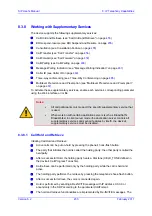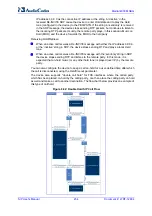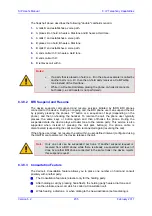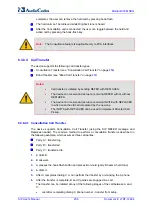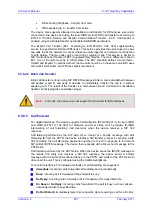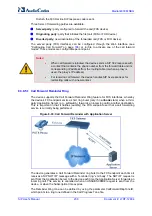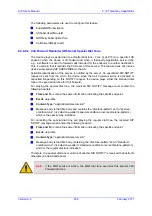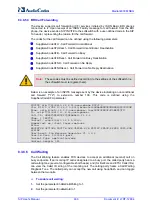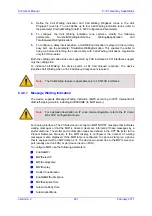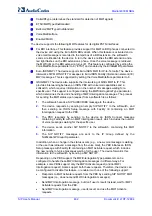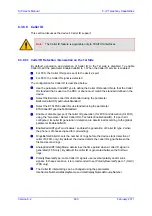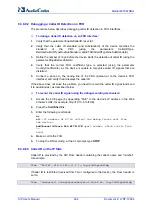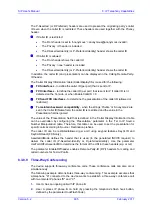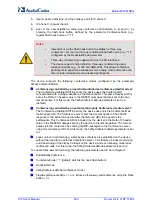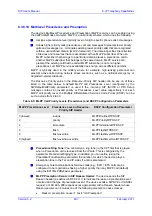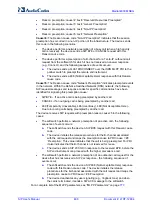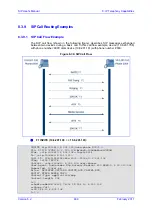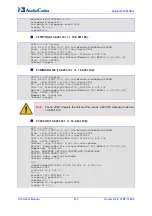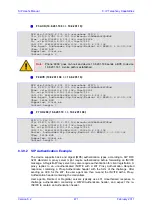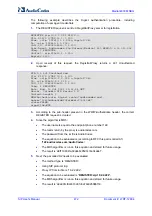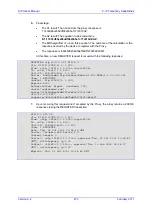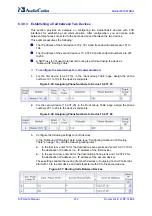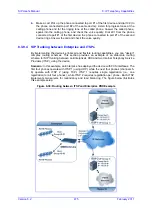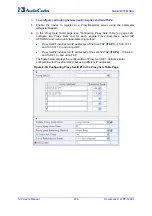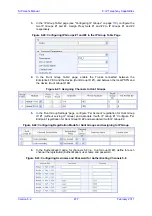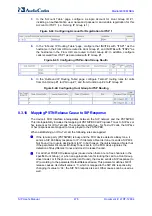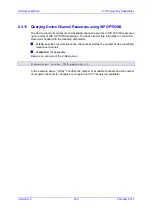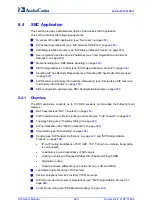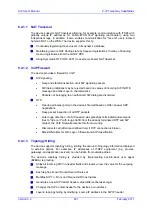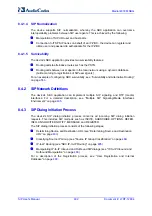
Version 6.2
467
February 2011
SIP User's Manual
8. IP Telephony Capabilities
8.3.8.10 Multilevel Precedence and Preemption
The device's Multilevel Precedence and Preemption (MLPP) service can be enabled using
the CallPriorityMode parameter. MLPP is a call priority scheme, which does the following:
Assigns a precedence level (priority level of call) to specific phone calls or messages.
Allows higher priority calls (
precedence call
) and messages to preempt lower priority
calls and messages (i.e., terminates existing lower priority calls) that are recognized
within a user-defined domain (
MLPP domain ID
). The domain specifies the collection
of devices and resources that are associated with an MLPP subscriber. When an
MLPP subscriber that belongs to a particular domain places a precedence call to
another MLPP subscriber that belongs to the same domain, MLPP service can
preempt the existing call that the called MLPP subscriber is on for a higher-
precedence call. MLPP service availability does not go across different domains
MLPP is typically used in the military where for example, high-ranking personnel can
preempt active calls during network stress scenarios, such as a national emergency or
degraded network situations.
The Resource Priority value in the Resource-Priority SIP header can be any on of those
listed in the table below. A default MLPP call Precedence Level (configured by the
SIPDefaultCallPriority parameter) is used if the incoming SIP INVITE or PRI Setup
message contains an invalid priority or Precedence Level value respectively. For each
MLPP call priority level, the Multiple Differentiated Services Code Points (DSCP) can be
set to a value from 0 to 63.
Table
8-5: MLPP Call Priority Levels (Precedence) and DSCP Configuration Parameters
MLPP Precedence Level Precedence Level in Resource-
Priority SIP Header
DSCP Configuration Parameter
0 (lowest)
routine
MLPPRoutineRTPDSCP
2 priority
MLPPPriorityRTPDSCP
4 immediate
MLPPImmediateRTPDSCP
6 flash
MLPPFlashRTPDSCP
8 flash-override
MLPPFlashOverRTPDSCP
9 (highest)
flash-override-override
MLPPFlashOverOverRTPDSCP
Precedence Ring Tone:
You can assign a ring tone (in the CPT file) that is played
when a Precedence call is received from the IP side. This is configured by the
parameter PrecedenceRingingType. In addition, you can define (using the
PreemptionToneDuration parameter) the duration for which the device plays a
preemption tone to the Tel and IP sides if a call is preempted.
Emergency Telecommunications Services calls (e.g., E911): ETS calls can be
configured to be regarded as having a higher priority than any MLPP call (default),
using the E911MLPPBehavior parameter.
MLPP Preemption Events in SIP Reason Header:
The device sends the SIP
Reason header (as defined in RFC 4411) to indicate the reason a preemption event
occurred and the type of preemption event. The device sends a SIP BYE or CANCEL
request, or 480, 486, 488 responses (as appropriate) with a Reason header whose
Reason-params can includes one of the following preemption cause classes:
•
Reason: preemption ;cause=1 ;text=”UA Preemption”
Summary of Contents for Mediant 800 MSBG
Page 2: ......
Page 366: ...SIP User s Manual 366 Document LTRT 12804 Mediant 800 MSBG Reader s Notes ...
Page 372: ...SIP User s Manual 372 Document LTRT 12804 Mediant 800 MSBG Reader s Notes ...
Page 390: ...SIP User s Manual 390 Document LTRT 12804 Mediant 800 MSBG Reader s Notes ...
Page 404: ...SIP User s Manual 404 Document LTRT 12804 Mediant 800 MSBG Reader s Notes ...
Page 616: ...SIP User s Manual 616 Document LTRT 12804 Mediant 800 MSBG Reader s Notes ...
Page 636: ...SIP User s Manual 636 Document LTRT 12804 Mediant 800 MSBG Reader s Notes ...
Page 652: ...SIP User s Manual 652 Document LTRT 12804 Mediant 800 MSBG Reader s Notes ...
Page 886: ...SIP User s Manual 886 Document LTRT 12804 Mediant 800 MSBG Reader s Notes ...

